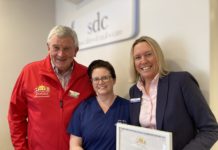Life sciences businesses from across Yorkshire have come together to discuss how collaboration can help build future resilience for the sector and help companies here to benefit from change dynamics. Already a hotbed for innovation in health tech and medical devices, the region has the opportunity to captialise on its strong healthcare infrastructure by sharing insights and peer-to-peer learning.
The event was hosted by Leeds-headquartered Lhasa, a not-for-profit organisation which creates cutting-edge software solutions that are used globally to streamline drug development, reduce unnecessary animal testing, and ultimately benefit human health. Focusing on ‘Building resilience in the life sciences sector: Navigating an ever-changing landscape’, it was organised by law firm Clarion along with international audit, tax and advisory firm Mazars and Huddersfield-based regulatory and quality consultancy, Woodley BioReg.
Keynote speakers included Tom Hutchinson, health and life science sector manager at the West Yorkshire Combined Authority, who talked about the region’s strength in health and life sciences, with over 600 companies, employing around 196,000 people, and outlined how support from the Combined Authority is helping to accelerate opportunities in the life science sector.
Tarifa Simpson, leading deals in the sector for Mazars, provided an insight into the investment landscape with life sciences continuing to be an attractive sector for investors and funders, and levels of transactions remaining above pre-pandemic levels.
Sue Streatfield, partner in intellectual property at Clarion, gave tips about how businesses can maximise their IP assets by ensuring they are protected in the most resilient way from the idea stage, through to planning commercialisation and creating revenue. She stressed that IP is a valuable asset and can be used as security for a loan, sold or even licensed out in return for royalties.
Dr Ash Ramzan, Managing Director at Woodley BioReg, discussed regulatory changes across pharmaceutical, biopharmaceuticals, devices and diagnostics. Using real life examples, Ash focussed on how businesses can build resilience through consolidation, horizon scanning and future proofing, and talked about the continuing uncertain regulatory environment following Brexit and Covid as well as the importance of ensuring supply chain resilience.
A panel comprising Fabien Rascagneres, Head of Global Supply Planning at global biopharmaceutical business AstraZeneca; Carly Haigh, Vice President of Client Services at medical communications agency Six Degrees Medical Consulting; Asam Malik, Head of Technology & Digital Consulting at Mazars, and Dr Ash Ramzan from Woodley BioReg, then took questions from delegates. Topics included how the panel had coped with change in the market in recent years. Mr Rascagneres explained the need to invest for capability and capacity to cope with supply chain volatility, while Mr Malik talked about the speed of change of tech commoditisation, such as AI, and how this accessibility also brings greater risk, for example, mid-tier firms are more vulnerable to cyber-attacks.
The discussion also covered the healthcare sector’s move away from animal testing and the development of new types of cell-based testing particularly for biological products, plus the focus on achieving carbon-zero and the need to improve skills within the industry.
With speakers and delegates agreeing that collaboration is vital, further events are planned to connect people working in life sciences across Yorkshire.









